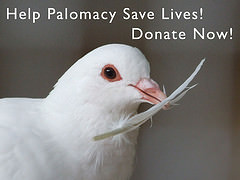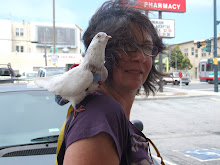Rescue Worthy?

By accident, I’ve become a king pigeon rescuer. I spend many hours every day working on their behalf. I racked up over 3,000 pigeon transport miles last year. I’ve spent a few thousand dollars of my own money and almost as much donors' money on avian vet care. I care for foster birds; recruit, review, approve and support adopters; maintain a website and a blog, do tons of data-entry and even more outreach and PR and fundraising. I’m good at king pigeon rescue and, in not quite two years, I’ve helped more than 150 avoid euthanasia and get into top-quality adoptive homes.
I love doing it. It cracks me up that I have twenty-something white king pigeon fosters in a loft and that I can tell them all apart. They are almost all all white. I love finding out who a bird is and getting to know its personality and quirks. I have thousands of pictures of king pigeons stored on my hard drive and almost every day I still grab my camera and run to photograph them doing something funny or interesting or beautiful. Every time I hear about another one (or ten) whose time in a shelter is about to run out, I’m motivated to drop everything and send out the urgent e-mails looking for space for one (or ten) more. I love meeting other people who want to help and getting their support through the letdowns and sharing the good times.
But the thing is, these are domestic meat birds bred to be butchered and served as squab. They’re neither rare nor endangered. It’s as if I decided to rescue Foster Farms' chickens, one at a time. I've spent many, many hours helping them and have saved 150. Squab plants process 50 an hour. When polar bears and tigers and gorillas are going extinct, when kids are starving and refugees fleeing wars, does my work as a king pigeon rescuer make any sense at all? Is this a worthwhile effort? Should I be redirecting my energy to something more important to the world? And, to make matters worse, I’m not tackling the source of the problem. I’m just helping those lucky few birds who escape the butcher and beat the odds to survive the streets long enough to get taken to an animal shelter.
I know that what I do matters to the birds I’m able to help save. They didn’t ask to be born but they want to live. And I’ve been happily surprised by the amount of support and encouragement I’ve gotten. I’m not the only one who cares about these disposable birds.
I didn’t start out looking for a cause. I worked thirteen years on the frontlines of the war on poverty and, while I loved it, I wasn’t ready to re-enlist. But I met a king pigeon named Gurumina and she needed and deserved help. So I helped her and every king pigeon that’s crossed my path since (and a lot of other stuck-in-shelter birds, like quail and chukars and roosters that I've met along the way). I can’t say for sure that, if I wasn’t doing this, I’d be fighting for polar bears or renewable energy or libraries or equal rights. So maybe it’s just good that I’m doing something. Is it good enough?
Please click here to see Care2 readers' comments and to participate in a poll.
A thoughtful response from Mickaboo Companion Bird Rescue volunteer Jonathan
Hi Elizabeth - I enjoyed seeing your story of Frances in the Chronicle, but I was moved even more by your blog post to Care2.com - not so much for the responses it generated, affirming though they were, but for the honest self-examination that prompted you to post it. You raise an important and courageous question: when there are so many abandoned companion animals as well as wild and endangered creatures needing help, whether it is fair or a wise use of scarce resources to rescue "poultry."
The issue, as I see it, was settled hundreds if not thousands of years ago by hearts and minds far greater than mine.
Your question recalls the story of the woman who spent a bundle on expensive perfumed oil to anoint Jesus' head (Matthew 26:6-13; the same story is in Mark and John). His disciples were upset because the money she spent could have been used to feed or otherwise aid people in far greater need. Jesus answered (I'm paraphrasing), "The poor are always going to be here, but I won't be. This woman has done a beautiful thing for me, and she always will be remembered for it." That reply has been the subject of much consternation and misinterpretation by critics and apologists from both left and right, who at their worst have taken it to mean that Jesus was not particularly concerned about helping the poor on Earth as a class - a notion refuted by even a cursory reading of the Gospels. For me, the essential truth Jesus touches in this statement is that all morality ultimately is grounded in the love and compassion we show one another as individuals.
A similar point was made by philosopher Immanuel Kant in his rejoinder to Jeremy Bentham's Utilitarianism (Critique of Practical Reason, 1787). Kant repudiated Bentham's notion that whatever produces the most happiness in the most people is the most moral course of action ("the greatest good for the greatest number"). No, Kant argued, the only true basis of moral action is to see and treat each person as an end in him/herself, never as a means to an end. But, he pointed out, utilitarian calculations would justify sacrificing one individual for the benefit of others, if it could be shown that doing so would produce more total "good." And if that were done, it would be the most horrible way of reducing people to their functional importance instead of treating them ends in themselves. Ironically, such a moral system would end up devaluing the very individuals it is supposed to benefit.
If we want to extend moral action to our relations with the natural world - or at least with intelligent animals - the same reasoning applies. When St. Francis bought the doves being taken to market and freed them (we hope they were native European birds who could join a wild flock, not end up like most released King Pigeons!), he wasn't rescuing ALL doves, and he knew he couldn't. He was making a statement. And he was acting with compassion toward those individual birds, which is exactly what you are doing. It doesn't matter what species they are. They are intelligent, feeling, individual creatures who are suffering. The alternative, "greatest good for the greatest number" approach to rescue is embodied in animal shelters, which euthanize most of those they take in - millions every year.
Public policy (including ecological policies) cannot be made for individuals, obviously, only for groups. But the work of rescue is grounded in love, which requires us to know another individual and to want and work for what is best for it. With so many needing our help, perhaps we never can achieve that goal on a large scale. But trying is the only way to go.
Jonathan









1 Comments:
I wanted to reply to Johnathan's reply to your Care 2 post! Johnathan your words are beautiful and more documentation and proof that the King Pigeons are worth it!
Thank you!
Cheryl
Post a Comment
Subscribe to Post Comments [Atom]
<< Home